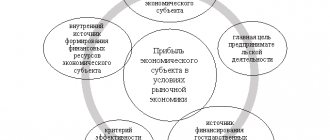Why do you need tax accounting?
Each type of accounting is focused on its purpose. The result of the work of accountants is financial statements compiled according to principles approved by the state.
Management accounting also provides information about the financial performance of a business, but in formats convenient for management and owners.
But in both cases, calculating mandatory payments is not a primary task. Therefore, businessmen often have to organize special tax accounting (TA).
Results
The differences between accounting and tax accounting are manifested primarily in the purposes for which these accounting systems are developed. These differences result in differences that must be taken into account when calculating taxes.
How is accounting different from tax accounting? Is it possible to bring these two types of accounting closer together, or is it impossible and not worth even trying? We will talk about the relationship between accounting and tax accounting and their differences in this material.
Discrepancies between accounting and NU arise due to different requirements of legislative acts governing these 2 types of accounting, as well as due to different approaches to accounting enshrined in accounting and tax accounting policies.
Differences between accounting and NU are reflected in accounting, which makes it possible to compare the conditional income tax expense (income), accrued from the amount of accounting profit, and the current profit tax, calculated according to the rules of NU.
Principles and procedure for organizing tax accounting
The general rules for maintaining tax accounting are reflected in Art. 313 Tax Code of the Russian Federation.
Tax accounting is based on the same basic principles as accounting:
- Monetary measurement - accounting of all transactions in rubles.
- Separation of property - separation of objects owned by the organization from those leased, taken as collateral, etc.
- Continuity – maintaining records throughout the entire “lifetime” of the business.
- Temporary certainty – the procedure for recognizing income. Depending on the type of tax, they can be recognized both as accrual and as payment.
- Consistency – all applicable standards should generally be applied unchanged from year to year. Exceptions are possible if legislation changes or the company adjusts its accounting policies.
- Equalization - income and related expenses should be taken into account in one tax period.
The tax base can be calculated in two ways.
If “ordinary” accounting data is sufficient to calculate the mandatory payment, then the tax is calculated based on these figures.
And if the necessary information is not in the accounting, then the businessman must use additional forms - tax registers. The format of some of them is established by regulations. These are, for example, books of sales and purchases under VAT or a book of income and expenses under the simplified tax system.
If a businessman himself develops tax registers, then they must include a number of mandatory details:
- Name.
- Period (date).
- Type of operation.
- Amount, and if available, quantity in natural units.
- Signature of the responsible person with transcript.
In small enterprises, tax accounting is usually carried out by the same specialists who do accounting. And in medium and large companies, separate divisions can be organized for this purpose.
What is tax accounting, who does it and what does it depend on?
Tax accounting is a separate type of accounting designed to systematize information from primary documents to determine the amount of a particular tax. Tax accounting is carried out mainly by accounting workers, although in large companies there are special departments, services and even departments for this - it all depends on the size of the company, the types of taxes paid and a number of other factors (the number and variety of taxable objects, their geographical location, etc.) .
The amount of information contained in tax registers and necessary for calculating taxes depends on many factors. For example, to calculate transport tax, it is not enough to have a list of vehicles that are registered by the company with the traffic police or Rostechnadzor. Correct calculation cannot be made without data on engine power, date of registration or deregistration. In addition, you cannot do without knowledge of the Tax Code (regarding the procedure for calculating taxes) and regional legislation (regarding tax rates, benefits, reporting deadlines, etc.).
On the issue of application of the provisions of Art. 313 of the Tax Code of the Russian Federation, disputes often arise with tax authorities. ConsultantPlus experts have selected the latest judicial practice. Get trial access to the K+ system and go to the analytical selection.
For more information about calculating transport tax, read the material “How to calculate transport tax on a car?” .
Income tax
Many businessmen, when they talk about tax accounting, mean, first of all, income tax. Not surprising - the calculation of this particular mandatory payment is associated with many nuances.
Although formally the tax base for profit is similar to the accounting result - the financial result for the period, in practice everything is much more complicated.
The procedure for accounting for many types of income and expenses for income tax differs significantly from that adopted in accounting. Here are just a few examples:
- Depreciation. Accounting policies may stipulate that different methods of calculating depreciation are used in accounting and tax accounting.
- Reserves formed for various expected expenses. For example, reserves for the payment of vacation pay or for doubtful debts do not need to be created in tax accounting, but in accounting they must be required (except for small enterprises).
- Limited costs. Some types of expenses, for example, travel or entertainment expenses, are recognized in full in accounting, and in tax accounting - within established limits.
There are so many discrepancies between accounting and tax accounting that businessmen often keep parallel records of all income and expenses in separate registers to calculate income tax.
Responsibility for missing registers
Attention: during an on-site inspection, inspectors have the right to request from the organization tax registers confirming the calculation of the tax base (clause 1 of Article 93 of the Tax Code of the Russian Federation). For failure to submit these documents within 10 working days from the date of receipt of the written request, tax and administrative liability is provided (Clause 3 of Article 93, Article 120 of the Tax Code of the Russian Federation, Part 1 of Article 15.6 of the Code of Administrative Offenses of the Russian Federation).
The absence of tax registers is recognized as a gross violation of the rules for accounting for income and expenses. Responsibility for it is provided for in Article 120 of the Tax Code of the Russian Federation.
If such a violation was committed during one tax period, the inspectorate has the right to fine the organization in the amount of 10,000 rubles. If a violation is detected in different tax periods, the fine will increase to RUB 30,000.
A violation that led to an understatement of the tax base will entail a fine of 20 percent of the amount of each unpaid tax, but not less than RUB 40,000.
In addition, for failure to submit tax registers at the request of the tax inspectorate, the court may impose administrative liability on officials of the organization (for example, its head) in the form of a fine in the amount of 300 to 500 rubles. (Part 1 of Article 23.1, Part 1 of Article 15.6 of the Code of Administrative Offenses of the Russian Federation). Tax liability for a similar violation is established by Article 126 of the Tax Code of the Russian Federation. However, paragraph 1 of Article 126 of the Tax Code of the Russian Federation provides for the accrual of a fine for each unsubmitted document. Since the organization determines the number and form of tax accounting registers independently (Article 313 of the Tax Code of the Russian Federation), it is impossible to determine in advance how many registers should be submitted to the inspectorate. Consequently, the amount of the fine in the situation under consideration cannot be determined. Some arbitration courts confirm this conclusion (see, for example, the resolution of the Federal Antimonopoly Service of the North-Western District dated February 2, 2004 No. A13-6442/03-21).
If the organization is unable to submit the required documents within 10 working days from the date of receipt of the request, the tax office must be notified in writing. In the notice, indicate the reasons and the deadline within which the documents can be submitted. Based on this notification, the inspection may (but is not obligated to) extend the deadline for submitting documents. The inspection must make a decision on extending (refusing to extend) the deadlines within two working days after receiving a notification from the organization. Such rules are provided for in paragraph 3 of Article 93 and paragraph 6 of Article 6.1 of the Tax Code of the Russian Federation.
VAT
The main registers for calculating VAT are the books of sales and purchases (Resolution of the Government of the Russian Federation of December 26, 2011 No. 1137). Payers of this tax enter invoices issued and received in them. Then, based on the results of the quarter, the total amount of accrued and deducted VAT is determined, as well as the total to be paid or reimbursed from the budget.
There is also an additional register - a log of received and issued invoices. It is used by commission agents, agents, forwarders and developers. Those. in this case we are talking about businessmen who act in the interests of others.
General provisions of the law on tax accounting
Taxpayers calculate the tax base at the end of each reporting (tax) period based on tax accounting data.
Tax accounting is a system for summarizing information to determine the tax base for a tax based on data from primary documents, grouped in accordance with the procedure provided for by this Code.
If the accounting registers do not contain enough information to determine the tax base in accordance with the requirements of this chapter, the taxpayer has the right to independently supplement the applicable accounting registers with additional details, thereby forming tax accounting registers, or maintain independent tax accounting registers.
Tax accounting is carried out in order to generate complete and reliable information on the accounting procedure for tax purposes of business transactions carried out by the taxpayer during the reporting (tax) period, as well as to provide information to internal and external users to monitor the correctness of calculation, completeness and timeliness of calculation and payment in tax budget.
The tax accounting system is organized by the taxpayer independently, based on the principle of consistency in the application of tax accounting norms and rules, that is, it is applied sequentially from one tax period to another. The procedure for maintaining tax accounting is established by the taxpayer in the accounting policy for tax purposes, approved by the relevant order (instruction) of the head. Tax and other authorities do not have the right to establish mandatory forms of tax accounting documents for taxpayers.
Changes in the accounting procedure for individual business transactions and (or) objects for tax purposes are carried out by the taxpayer in the event of changes in the legislation on taxes and fees or the accounting methods used. The decision to make changes to the accounting policy for tax purposes when changing the applied accounting methods is made from the beginning of the new tax period, and when changing the legislation on taxes and fees, no earlier than from the moment the changes in the norms of this legislation come into force.
If the taxpayer began to carry out new types of activities, he is also obliged to determine and reflect in the accounting policy for tax purposes the principles and procedure for reflecting these types of activities for tax purposes.
Tax accounting data must reflect the procedure for forming the amount of income and expenses, the procedure for determining the share of expenses taken into account for tax purposes in the current tax (reporting) period, the amount of the balance of expenses (losses) to be attributed to expenses in the following tax periods, the procedure for forming the amounts of created reserves , as well as the amount of debt for settlements with the budget for taxes.
Tax accounting data is confirmed by:
- primary accounting documents (including an accountant’s certificate);
- analytical tax accounting registers;
- calculation of the tax base.
Forms of analytical tax accounting registers for determining the tax base, which are documents for tax accounting, must necessarily contain the following details:
- register name;
- period (date) of compilation;
- transaction meters in kind (if possible) and in monetary terms;
- name of business transactions;
- signature (decryption of signature) of the person responsible for compiling these registers.
The content of tax accounting data (including data from primary documents) is a tax secret. Persons who have access to information contained in tax accounting data are required to maintain tax secrets. For its disclosure they bear responsibility established by current legislation.
Unified agricultural tax
The calculation of the unified agricultural tax is in many ways similar to the calculation of income tax: it is necessary to determine the difference between income and expenses.
The law allows legal entities to determine the taxable base for the Unified Agricultural Tax on the basis of accounting data (clause 8 of Article 346.5 of the Tax Code of the Russian Federation). However, you need to keep in mind that income and expenses under the unified agricultural tax are determined “by payment”, so it will not be possible to directly use accounting data.
Individual entrepreneurs may not keep accounts at all, so a special book for recording income and expenses under the Unified Agricultural Tax has been developed for them (Order of the Ministry of Finance of the Russian Federation dated December 11, 2006 No. 169n).
Kinds
Tax accounting can be divided into types depending on the objects of tax accounting:
- tax accounting of organizations;
- tax accounting of individuals.
Tax accounting can also be divided into types depending on the grounds for registration. In accordance with the Tax Code of the Russian Federation, taxpayers are subject to registration with the Federal Tax Service at the location of the organization (for individuals - at the place of residence, for entrepreneurs without forming a legal entity - at the location or place of residence), at the location of separate divisions, at location of real estate and vehicles subject to taxation.
UTII and patent system
When using these modes, the tax is determined based on physical parameters. This may be the number of employees, area of premises, number of vehicles, etc. Each taxpayer determines the procedure for accounting for these indicators himself.
In this case, income and expenses are not needed to calculate the tax itself. But for those who use PSN, income accounting is necessary to control the limit. The fact is that a patent can only be used if annual revenue does not exceed 60 million rubles. To track revenue, entrepreneurs using PSN must keep an income book (Order of the Ministry of Finance dated October 22, 2012 No. 135n).
Definition of accounting and tax accounting and the purpose of their application
The result of the above: tax accounting allows government agencies to control the completeness and timeliness of tax payment. And accounting, in turn, is carried out with the aim of drawing up financial statements, on the basis of which one can judge the results of the financial and economic activities of the organization.
So, organizations that are payers of income tax, along with accounting, maintain tax records in order to calculate the tax base for income tax.
Tax registers
The register is a summary table where data on all business transactions of the organization is entered. Of greatest interest are accounting and tax registers. The former are designed to collect and document information about financial transactions. They are formed on the basis of primary documents that are brought to the accountant. The tax register is, in essence, the same account. report. The only difference is that certain lines may be missing from the tax register or, conversely, may supplement the financial statements. The Tax Code does not stipulate that tax registers must be kept in a strictly defined form. This is at the discretion of the accountant. Therefore, many specialists simply supplement ready-made accounting registers with those necessary for calculating the tax base. This is not prohibited by law.
Tax registers are maintained in case of income tax deductions - Art. 313, 314 Tax Code of the Russian Federation. In other cases, maintaining tax registers is not provided. There are 4 general rules for maintaining tax records. They relate to the mandatory reflection of the following information:
- data on income and expenses;
- cost share data;
- data on losses that are planned to be carried forward to the next reporting period;
- data on reserves and tax debt.
The tax register also includes:
- Name;
- date of;
- period;
- name of the business transaction;
- transaction meters in cash or in kind;
- signature of the person responsible for the document.
All these information blocks are reflected in the Tax Code of the Russian Federation and must be entered into registers without fail. As practice shows, accountants prefer to supplement financial statements with additional registers for reporting to the tax authorities. The law does not prohibit this.








